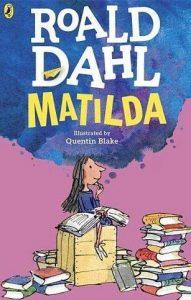“It’s a funny thing about mothers and fathers. Even when their own child is the most disgusting little blister you could ever imagine, they still think that he or she is wonderful.”
And so began one of the most well-loved children’s books of all times!
Matilda was one of Roald Dahl’s last ever novels and also one of his greatest. First published in 1988, it has been adapted into multiple plays and movies since all of which have received success.
It’s a story of a little girl with magical powers and a love for knowledge. She’s independent and intelligent and an incredible role model for kids everywhere. The novel has entertaining scenes and memorable characters that have stayed with children for generations.
Summary
The book follows the tale of a five-year-old girl called Matilda. Ignored and mistreated by her parents, she uses her mysterious magic abilities to play harmless pranks, especially on her father. When she starts school, she immediately adores the kind Ms Honey and fears the ferocious Ms Trunchbull. There’s unexplained deaths, tyrannical teachers, and illegal activities throughout the novel. Matilda tries to make the world around her a better place and affects more than a few other characters as a result. But what’s the point in having telekinetic powers if you don’t use them?
Commentary
Best known from its 1996 film adaptation, children have loved Matilda since the time of its release. It’s a brilliant tale of magic and good, that leaves all of its readers content.
Praise
- Children are treated like people. It’s very difficult to find a book where younger characters are treated as human beings rather than a burden, comic relief, or ‘something cute’. Children are just a human as adults and have their own thoughts, ideas and humour. Roald Dahl captures this perfectly with Matilda, who’s an incredibly intelligent young girl that understands the darker side of life.
- The characters are completely over the top, but brilliantly entertaining. Despite the fact they are not realistic in the slightest, it is a children’s book and the fact that they’re amusing to read about more than makes up for it. Matilda’s parents are loud and rude, Ms Trunchbull is a tyrant, and Miss Honey is the sweetest creature in the world.
- The novel tells children that life isn’t perfect but things will always get better. It shows Matilda in an unloving unappreciative family who want nothing to do with her, and then gives her a happy end anyway because she worked for it. Matilda teaches children that they can create a better life.
Critique
- The book portrays all the ‘good’ characters and thin and beautiful, whereas all the ‘bad’ characters are overweight and ugly. Despite the fact, it’s a children’s book and this is only done for comedy, these features shouldn’t be comedic, to begin with. Physical appearance is by no means an accurate representation of a person’s personality.
- The way Matilda’s parents and Ms Trunchbull treat children is less ‘bullying’ and more ‘abuse’. Children reading this book should never be shown this serious topic in such a light-hearted way. Matilda fights back against the ‘evil’ adults by pranking and injuring them, showing the novel’s readers that violence is the only answer.
- It tells parents not to praise their children. Not a single adult praises any child, and some go so far as to say children are over-praised constantly. Even the lovely Miss Honey tells Matilda that parents overestimate the intelligence of their ‘mediocre’ children. It’s a horrible mindset for parents to get into but even worse for children.
Recommendations
Overall, I’d give Roald Dahl’s Matilda a three out of five. It’s an entertaining novel, if a bit extreme, that teaches children there’s nothing wrong with being smart. It shows them how they can change their own life for the better and that you always have to stand up for yourself.
I’d definitely recommend it for younger children between the ages of five and nine but also for adults who have never before read the book. I’s a lighthearted tale full of magic and mischief and well-worth the read.

Want to read it for yourself?
Prefer to listen instead?
